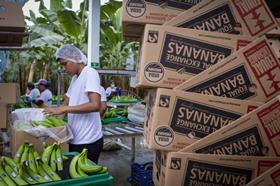
All bananas may look the same on a grocery store shelf, but not all bananas are created equal. That’s the message behind Equal Exchange Produce’s Banana Month campaign running this March.
The aim of the annual campaign is to educate and celebrate the unique supply chain that Equal Exchange supports – one that’s built on long-term, direct partnerships with small-scale farmer cooperatives, is Fairtrade and organic-certified, and has been leading the industry toward just, sustainable change for 16 years.
The company said it is proud to be pioneering a radically different business model that prioritises people over profit.
This March, Equal Exchange Produce is spreading education and awareness about the true costs of banana production and the impact the pandemic has had on farmers and the supply chain.
“Bananas have long been the cheapest thing in the produce aisle, regardless of their long and complicated journey from farms in South America to stores in the US Retail prices for bananas have, on average, decreased in the last few decades, despite rising production and shipping costs, which have mostly been absorbed by farmers,” the company explained.
“The pandemic’s supply chain challenges and global inflation have made this system unsustainable. Equal Exchange Produce is proud to lead by example, supporting a supply chain that works for everyone involved.”
Founded on the premise that power should be shared with farmers, Equal Exchange establishes long-term trading relationships with farmer cooperatives, adhering to Fairtrade International’s minimum pricing and the Fairtrade premium fund.
US$1 of every box of bananas is democratically used by the cooperatives to invest in their communities and businesses, which has proven beneficial in times of economic downturn.
Equal Exchange works customers who hold similar values and are willing to pay a premium for a sustainable product, such as FreshDirect, its biggest customer in New York, and NYC cooperative veteran Park Slope.
“We at FreshDirect are extremely proud of our continued partnership with Equal Exchange, and their groundbreaking work to create a more equitable, democratic and sustainable food system,” said the retailer’s managing director, Dave Bass.
“Equal Exchange’s model of fostering mutually beneficial relationships between consumers and farmers around the world completely aligns with our mission to revolutionise the way fresh food is sourced, processed and delivered direct to consumers.”
Cecelia Rembert, produce coordinator and buyer at Park Slope Food Co-op, commented: “Equal Exchange is truly an exceptional model of equity and sustainability in the agricultural supply chain. We are fully committed to its avocado and banana programmes, as well as coffee and chocolate.
“We have so much gratitude for any instance where there is a transparent link from consumer all the way to producer, and such threads are unfortunately rare in this field.
“Equal Exchange has gone much further than that in their level of business integrity and social commitment; they are a true beacon in the agricultural industry.”
Equal Exchange Produce’s president, Nicole Vitello, said: “Dedicated customers from retail food cooperatives to independent retailers and e-commerce pioneers, allow us to fulfill the Equal Exchange cooperative mission of connecting small-scale farmers to the US market.
“They, in turn, are providing their members and customers with a fair and sustainable option for their fruit. From farmer to eater, we’re changing the food system together, for the better.”
This month, the company is inviting consumers to look out for new POS for Equal Exchange bananas that show “Not all Bananas are Created Equal”, a webinar series connecting the supply chain, and information on the farmer cooperatives it partners with.



